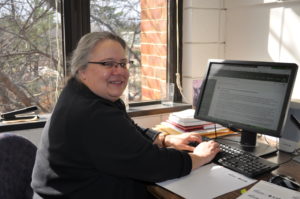ENG 302: English Department Collaboration = Win for Students and Faculty Alike
English 302 at George Mason University is a 300-level composition course that teaches undergraduates about the rhetorical conventions of research and writing in their academic disciplines. As part of the Mason Core, it is also a required course.
A 300-level, required, discipline-focused composition course is rare among American universities, but at George Mason, English 302 is a point of pride. Indeed, English 302 is a key part of an award-winning, vertically integrated writing program. In 2017, US News and World Report once again cited Mason as one of the top ten writing in the disciplines programs, along with Harvard, Cornell, Brown, and Duke.
This unique distinction of English 302, however, means that it is nearly impossible to find a comprehensive textbook for the course. Some textbooks address the rhetorical nature of writing, while other textbooks focus on writing in a specific discipline. There are few, if any, textbooks that guide students through the process of discovering how research and writing are conducted in an academic discipline, help them explore the ways in which a discipline generates and shares knowledge, and do so at the undergraduate level.
In addition, many textbooks that fill just some of the needs of English 302 students are expensive, and instructors have found that students increasingly try to get by without even inexpensive textbooks, making it difficult for instructors to draw on such materials in creating assignments and classroom activities.
Given the scarcity and cost of textbooks appropriate for English 302, instructors in the Composition Program at George Mason have long created many of their own materials, and have shared the results of their labors in a variety of informal ways. Such sharing among the community of over 60 instructors is especially helpful to graduate students and new hires who find themselves teaching a course they may not have taken, let alone taught.
In February 2016, when a group of English 302 instructors learned about Open Educational Resources (OER) at a workshop sponsored by the University Libraries, they saw a way to expand and formalize the existing culture of collaboration among English 302 instructors, and to make free instructor-created, classroom-tested curricular resources more widely and easily available.
Excited by this possibility, a team of nine experienced 302 instructors, coordinated by  Professor Catherine E. Saunders, applied for and received a 4-VA OER grant in 2016. Then they got to work.
Professor Catherine E. Saunders, applied for and received a 4-VA OER grant in 2016. Then they got to work.
“We faced a number of challenges,” says Saunders. “English 302 instructors welcome the chance to share the curricular materials they create with each other, but we also want to make sure that instructors receive credit for their individual contributions in salary, renewal, and promotion reviews. In addition, as members of a department deeply invested in writing as a professional activity, we believe that the creators of texts of all sorts should be compensated for their work.”
Adds Saunders, “The 4-VA grant allowed us to compensate team members, all of whom are full- or part-time contingent faculty, for the time spent revising their own materials, locating supporting material in existing OER collections, writing instructor’s notes, and reviewing colleagues’ contributions. In addition, we found that creative commons licensing allows us to give credit and trace the evolution of assignments and activities as we revise and rework the materials.”
During the first phase of the project, the team developed an 11-item collection of classroom-tested, peer-reviewed creative commons-licensed activities and assignments for English 302. In the second phase of the project, funded by a second 4-VA grant, an 11-member team — some veterans of the first phase, some users of the pilot collection who now want to contribute — migrated the course materials from a password-protected Blackboard to Mason’s Open Journal Systems (OJS) platform.
The new platform, designed during Spring 2018 by team members Psyche Ready and Joyce Johnston, hosts an expanded, more easily accessible collection with more user-friendly indexing and search options. In summer 2018, the team transitioned portions of the existing Blackboard collection to the new site, and will continue to add additional materials developed by members of learning communities.
The team also developed templates, instructions and procedures which will allow the collection to be expanded on an ongoing basis, using a model of submission and peer review similar to that of an academic journal. “We hope the collection will combine the strengths of traditional academic publishing and crowd sourcing,” explains Saunders. As she notes, “English 302, like all courses, is ever-evolving, as our students’ needs change and we gain new insight into how best to meet those needs; curriculum development is never finished!”
Saunders cites one piece of critical data that highlights another positive result: Cost savings for students. The percentage of textbook-free sections of English 302 increased from 20% in Fall 2016 to almost 60% in Spring 2017. Saunders concludes, “This 4-VA project is truly a trifecta: increased collaboration among instructors, greater availability of curricular materials specifically adapted to a signature GMU course, and cost savings for students. That’s a win.”
